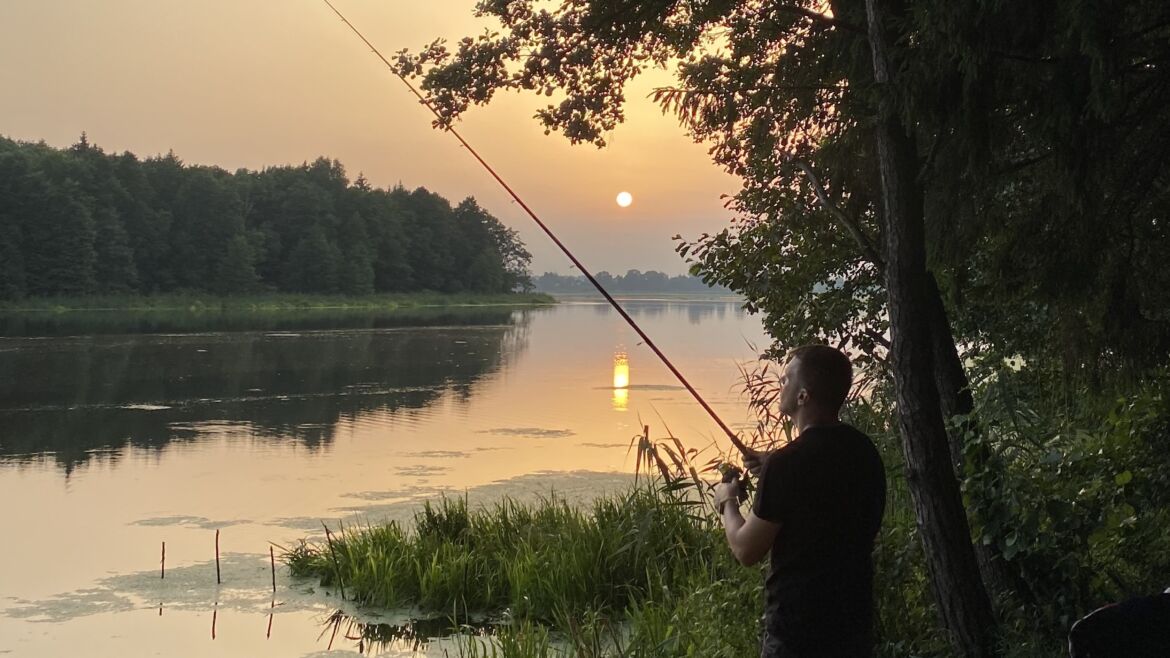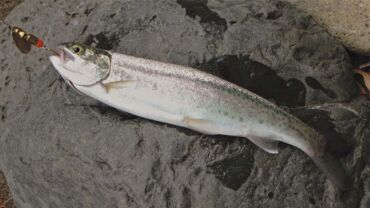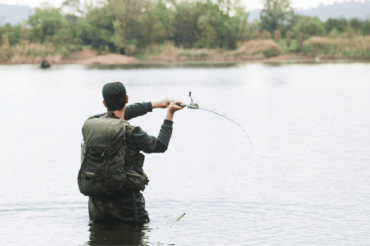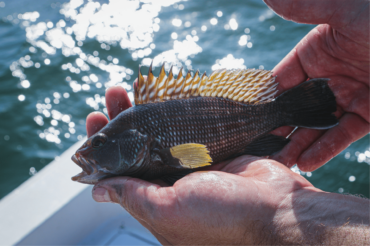Imagine a sunny day, perfect for fishing, and your catch is almost guaranteed. However, there are times when unexpected changes occur, and you return home without any fish. This occurs because fishing is attached to weather conditions, which gotta be ideal for successful fishing.
A beautiful day is not always a guarantee for the best fishing. This article will unlock the secrets of perfect fishing weather, demonstrating the best conditions for a great catch.
Expert Opinion on The Perfect Weather for Fishing
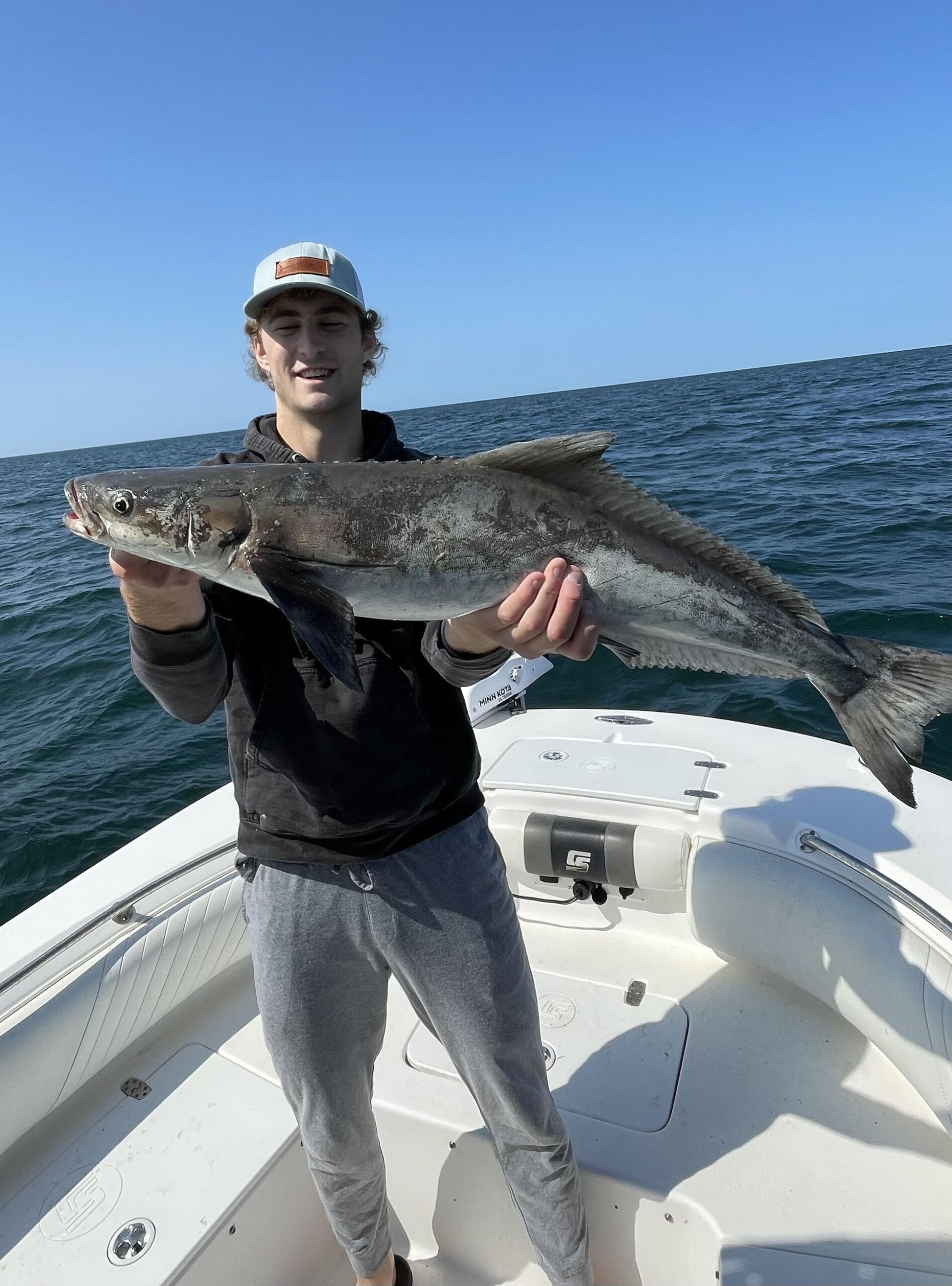
Pierce Latta
16 years fishing experience
“Unfortunately, for a mainly saltwater fisherman like myself, “perfect” weather is a rare luxury at the beach. Although most of the time the weather is far from ideal, I want to take some time to discuss my thoughts on the weather in response to the article above and some of the aspects it discussed, like temperature, wind, water clarity, and more.
First, let’s start with temperature—both water and air. Now honestly, as someone who fishes saltwater almost year-round, air temperature never affects the fishing too much unless I’m fishing inshore in shallower water. If it’s a super-hot day and you’re fishing inshore you’re going to need to find deeper water and holes where the water is cooler and fish can stay comfortably. I will say on a side note that while I have seen that air temperature has no immediate effect on fishing unless you’re fishing in shallower water, it will greatly affect the far more important water temperature over time. I have had times where the water temperature will drop 5-7 degrees over the course of a cold week and that really screws up the bite and shifts fish all over the place.
This brings me to the water temperature—this is what you really must watch. Now, before you even get out on the water it’s important to look at what you’re targeting because water temperature will greatly affect your approach to targeting the species you want to catch. For example, I do a ton of land-based shark fishing at the beach, and weather, as well as water temperature, is crucially important. Normally, if the water is below 70 degrees, shark fishing is bound to be slow from personal experience, however, the hotter it gets, the hotter the bite gets. So with water temperature, I would summarize by saying to pay attention to the water temperature and let that temperature and your research guide you to the most effective method of catching your target species.
Next, let’s talk about wind. In saltwater fishing, wind can either make or break your day of fishing. You want a little bit of breeze to keep things moving on the surface, but you don’t want too much wind that you can’t make it out of the inlet or make an accurate cast. Another note from personal experience, the farther out you are in the ocean, the more you need to consider wind.
Lastly, let’s talk about water clarity. I will always—and I mean always—prefer the clearest water possible, especially when offshore fishing. The fish can find your bait quicker and have cleaner takes when they go for your bait. Additionally, on nights when the ocean is calmer and the wind is down, sharks have been able to find my baits quicker, leading to more bites and hookups than on nights when it’s windy and the water clarity is poor.
Hopefully, you can see the trend I just identified here: the windier it is, the worse the water clarity is going to be, especially on the ocean side, so again, plan your days accordingly.
I want to end this excerpt with a word of encouragement to the readers. Weather is not always going to be good, in fact, a lot of times it’s going to be poor, but we must make the most of the time we are given and just spend time on the water. Time on the water, regardless of conditions, is the best thing you can do to become a better fisherman. Here’s an example of how this played out for me: two nights, one with perfect conditions and another with atrocious conditions. The perfect night, we landed a 10-foot lemon shark after a bit of waiting. On a terrible night, we landed a 7-foot sand tiger shark after sticking it out for 3 hours in 30 mph wind and rain. This goes to show that you need to put the time and work in—even on difficult nights with awful conditions. Don’t let imperfect conditions ruin your day. Good luck and tight lines!”
Visit his Instagram profile.
Subscribe to his YouTube channel.
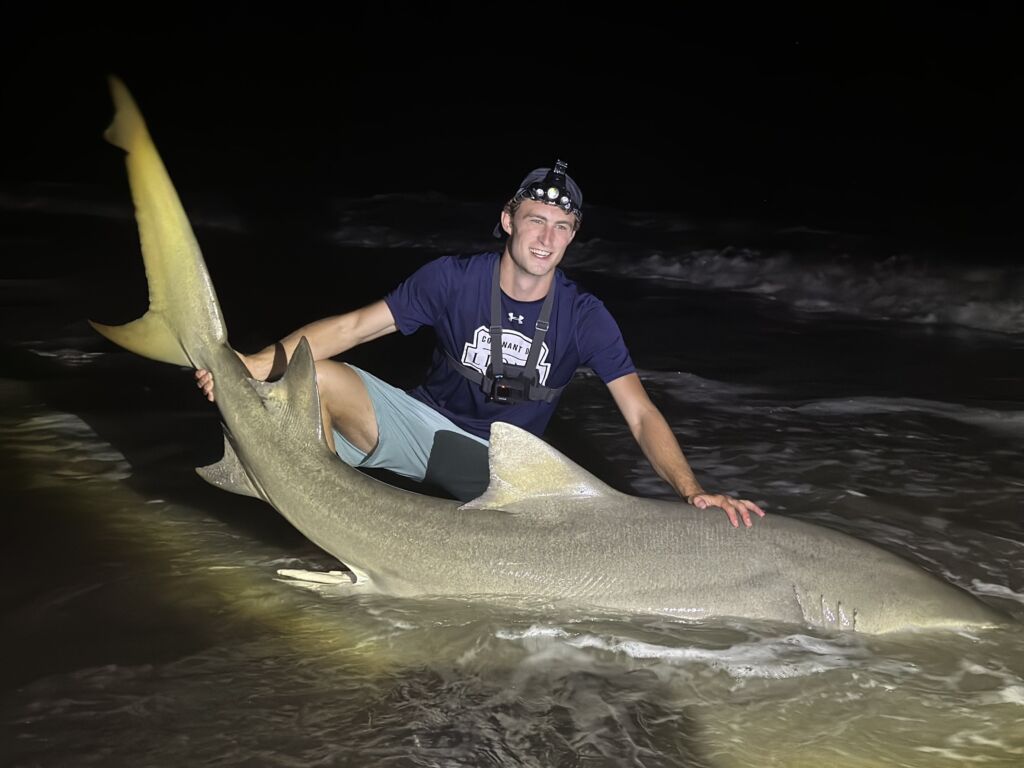
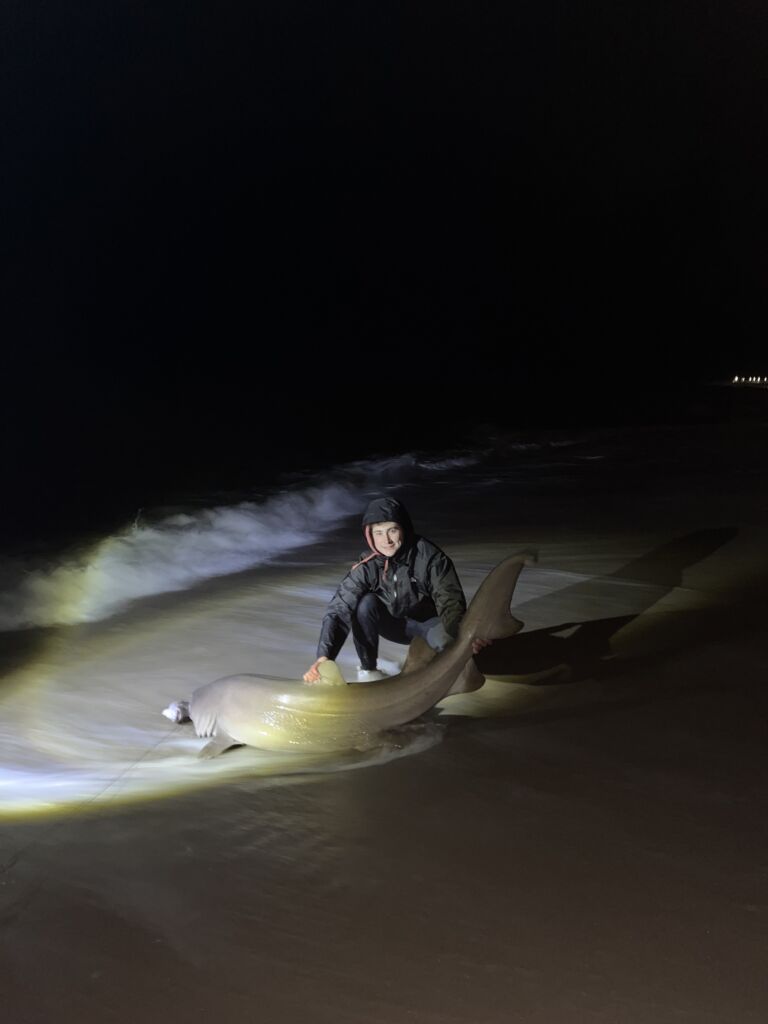
What Factors Affect Fishing in Different Weather Conditions
When you are fishing, you’re going to connect with nature in many different ways. One area of nature you connect with is weather conditions. Successful fishermen have learned to read nature signs to know when the best fishing weather is. Most people haven’t developed the skill to identify perfect fishing weather, but with practice – or help from technology – it can become easy.
Not just any technology will do. It takes special technology like our Fishbox app. Our app has the ability to predict when fish will be the most active and what the best time is to go fishing. With in-depth tools and over 10,000 featured bodies of water, determining when and where to fish has become much easier. Knowing when and where to fish, can guide you to some trophy fish.
Get your personalized fishing map
Answer a quick quiz and get your own personalized fishing map
Water Temperature
Fish are cold-blooded animals that depend on ambient temperature to regulate their internal temperature. Water temperature plays a fundamental role in fish feeding activity. As a general rule of thumb, the colder the water temperature the more sluggish the fish. For certain species of fish, as the water temps decrease below certain levels, the desire to feed decreases.
When the water temperature is higher, fish and other aquatic animals become more active and feed more. The higher water temperature accelerates their metabolism, making the fish active. This typically happens at a water temperature of around 68-72 degrees Fahrenheit (20-22 degrees Celsius). When the water is colder, it decreases fish metabolism and some species of fish enter a state close to hibernation; it’s as if they were sleeping to save energy. Other fish, especially predatory fish, become much less active and become very selective on the feeding opportunities that arise.
Hot days are also not ideal for fishing, as fish can also become less active. As the warm weather increases the water temperature, there is less oxygen in the water. This results in less activity and the fish look for deeper areas to cool off, decreasing food intake.
Atmospheric pressure
When it comes to fishing, barometric pressure is a vital weather condition. Barometric pressure directly affects the behavior of fish. Fish are very sensitive to any changes in atmospheric pressure. Changes in barometric pressure can cause them to become more or less active. For example, rapid drops in pressure can cause them to become more active and feed more. This is the time to fish! This brief moment of intense activity usually does not last long and stops when the pressure stops lower. Rises in pressure can cause them to be less active and find refuge.
Wind and Rain
The wind brings many changes to the water’s surface and affects the oxygenation of water. In addition debris and potential food is blown into the water. These changes happen suddenly and impact the way the fish act.
Winds with moderate speeds are ideal, as they change things just enough and blow insects and other food sources into the water. This causes fish to be active and look for food. Strong winds make it challenging to cast and turn the water turbulent, which makes the fish look for shelter.
Rain (in addition to being linked to atmospheric pressure) can be an ally or enemy for fishermen. A moderate amount of rain can wash food like insects into the water, causing fish to go into a frenzy and make them quickly take the bait. Heavy rains increase the clarity of the water, making it difficult for fish to see their food.
Read also: Do Fish Bite Better in the Rain? Exploring the Impact of Rainy Weather on Fishing
The Most Successful Weather Conditions for Fishing
As you read earlier, successful fishing depends on specific weather conditions. Let’s check the best weather for fishing.
Ideal Temperature
Both cold and hot waters negatively affect fishing. Most fish species have their ideal behavior around 71 F. The perfect range is what we generally find during spring and early summer.
Water Visibility
Visibility is vital when fishing, especially when using artificial bait. Fish favor clear water where they can notice bait movements and colors from a distance. However, feeding frenzies of certain species can occur in slightly turbid water conditions, this is also an ideal time for fishing.
Wind speed
Wind speeds ranging from 5-15 MPH is the ideal speed for fishing. Planning your fishing based on wind speed is essential. In strong winds, you won’t even be able to cast.
Tools and Resources for Climate Monitoring
Knowing how to read nature is a skill that takes years to develop, and not everyone has the time to develop that skill. Technologists have worked with fishermen over the years to develop specific, new technologies to help us understand what weather is best for fishing.
Traditional Tools
Before digital tools existed, fishermen used weather reports, weather forecasts, and fishing calendars that followed the season. Many experienced anglers often kept a fishing logbook to help track their success rates under various weather and water conditions. Anglers who understand how weather factors affect fish activity can successfully adjust their tactics.
Fishbox App
As valuable as this information is, it can be difficult to compile and review all of this information. Thankfully we now have tools like the Fishbox App so there is no need to keep a log, as everything can be tagged and logged in the app. From fishing locations and points to ideal conditions, you can have a detailed logbook to review past fishing adventures to help plan future ones.
Fishbox is the best and most complete digital tool for all types of fishermen. The fishing app is a great weather monitoring tool, the app offers a platform that tracks local weather conditions, determining the best time to fish.
These tools, in addition to being accurate and portable, are designed specifically for anglers, showing what weather is best for fishing.
Get your personalized fishing map
Answer a quick quiz and get your own personalized fishing map
Weather Tracking
In addition to providing accurate data and measuring the best times for fishing, the Fishbox App allows you to monitor all weather information in real-time. With this data, it shows you the good fishing weather, so you know what to expect in the changes that may affect the behavior of the fish.
Selecting the Ideal Time for Fishing
This is the most incredible feature of this app, The Fishbox App simply provides you with specific recommendations for your fishing trip, pointing out the best time to go and catch the fish you want. It’ll appoint the best weather for fishing.
Through the use of sophisticated algorithms, the Fishbox App surveys climatic data, cross-referencing them and identifying the ideal times for your fishing trip.
Every fisherman knows that fishing in unstable weather conditions can be problematic and often dangerous. With the right preparation, and using tools like the Fishbox App to track weather changes, you can have great fishing while staying safe.
Tips for Safe Fishing in Changeable Weather
Every fisherman knows that fishing in unstable weather conditions can be problematic and often dangerous.
Before you go fishing, check the current conditions and forecast on the Fishbox App. Remember that the weather can change suddenly, so it’s important to stay updated throughout the day. Remember, that in addition to rain, it is vital to protect yourself from the sun.
Be Flexible
Like everything in nature, the weather can change suddenly. Extreme weather such as storms and lightning can often bring danger. In these cases, change the date of your fishing trip and stay safe.
Use Flotation Equipment
When fishing from boats or in the water, always use safety equipment, such as life jackets or buoyancy jackets, especially in less-than-ideal or unstable weather conditions.
Communicate
In all cases, with good or less-than-optimal fishing weather, you should keep people you trust informed of your location and fishing plans. Keep your cell phone charged and with you.
Be Aware of Water Conditions
When fishing in the water or on a boat, understand the current water conditions. Unstable weather can cause sudden changes in the water, making the aquatic environment unpredictable and dangerous. Always ensure that you’re in the safest fishing conditions.
Conclusion
For fish to be active and feeding, they need specific weather conditions. For a successful fishing trip, you need optimal weather conditions. Luckily we have some excellent technology to help identify these conditions. Discover the secrets of perfect weather conditions and get an edge on Mother Nature by adding The Fishbox app to your angler’s arsenal.
The Fishbox App stands out as a great addition to the fisherman’s bag, helping you to find the best fishing conditions, and should be in every angler’s arsenal. This app monitors the weather and its changes in real-time, informing you of the best times to fish.
Use the available tools, such as Fishbox, and discover the secrets of the perfect weather conditions for great fishing.
